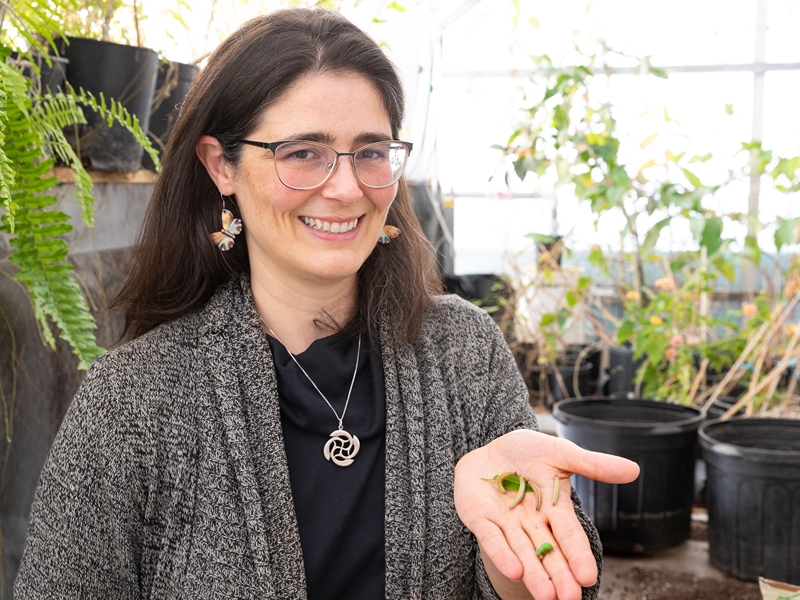The National Science Foundation awarded Erica Westerman, a recently tenured associate professor of biological sciences at the University of Arkansas, with a prestigious Faculty Early Career Development Award to support her research on the role of genetics and ambient light in shaping the visual sensitivity and behavior of butterflies.
The five-year, $1.35 million award will be used to study the “visual tuning” of butterflies, largely drawn from the Northwest Arkansas region. Visual tuning is a theory supposing that species sharing the same habitat are adapted to be the most sensitive to the color of light present in that specific habitat.
Westerman said she is particularly interested in “how the developmental environment interacts with the genome to shape the adult phenotype that we see. And in this particular instance, we're really interested in how the light environment may shape what butterflies can see and how what they can see influences what they do.”
In her proposal, Westerman noted that “determining the responsiveness of animal visual systems to changes in light environment, at both the seasonal and developmental scale, is particularly important in the context of climate change and human modification of the environment. Changes in season duration and the number of extreme weather events increase the potential for a mismatch between historically accurate developmental cues and adult environment, potentially causing a decrease in visual tuning for many primarily visual animals, including pollinators like butterflies.”
The proposal goes on to note that this could lead to the modification of adult visual sensitivity and vision-related behaviors, impacting their ability to forage or select mates. This would have serious implications for insect pollinators, many of which have a short generation and are highly visual.
“One of the reasons we're working with this community of butterflies is that they influence the flowers that we have in our prairies,” Westerman explained. “We have very high butterfly diversity here in Northwest Arkansas, so it's a great place to do this research. What the pollinators are able to see and consequently able to pollinate also influences which fruit crops we're going to have because a lot of our fruit crops are heavily dependent upon insect pollinators.”
The project has four overall goals:
1. Illuminate what role the developmental light environment plays in shaping the visual sensitivity and subsequent nectaring choices of a prominent American butterfly.
2. Dissect the effects of specific wavelengths of light on spectral sensitivity and subsequent visual mate choice.
3. Determine the prevalence of visual tuning in seasonal species assemblages of butterflies in American prairies.
4. Engage students of all ages in research on developmental plasticity and environmental effects to provide a real-world context for the effects of environmental perturbation on animal behavior and ecosystem health.
Of her interest in butterflies, Westerman explained that she’s “really interested in visual communication and how the developmental environment, both the physical and social environment, influences the way we visually communicate and how we respond to visual signals. To study that you have to work with a system that's primarily a visual communicator and none of our model animals — not the mouse, not the fruit fly, not the zebra fish — is a primarily visual signaler.”
“Butterflies use two-thirds of their brain to process visual information,” she continued. “So they are a perfect system to try and understand how the developmental environment influences the ability to do visual communication.”
CAREER awards are the NSF's most prestigious award for early career faculty who have the potential to serve as academic role models in research and education and to lead advances in their department or organization. The awards are for five years and include teaching and public-outreach components. This award will help lay the foundation of Westerman’s career.
About the University of Arkansas: As Arkansas' flagship institution, the U of A provides an internationally competitive education in more than 200 academic programs. Founded in 1871, the U of A contributes more than $2.2 billion to Arkansas’ economy through the teaching of new knowledge and skills, entrepreneurship and job development, discovery through research and creative activity while also providing training for professional disciplines. The Carnegie Foundation classifies the U of A among the few U.S. colleges and universities with the highest level of research activity. U.S. News & World Report ranks the U of A among the top public universities in the nation. See how the U of A works to build a better world at Arkansas Research News.
Topics
Contacts
Erica Westerman, associate professor of biological sciences
Fulbright College of Arts and Sciences
479-575-5348, ewesterm@uark.edu
Hardin Young, assistant director of research communications
University Relations
479-575-6850,
hyoung@uark.edu
